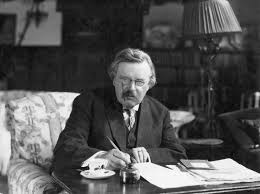In this part, we look at chapter V, “The God of Joy.” According to Nichols, Chesterton effectively produced a new argument for the existence of God: we feel or can feel a joy which has no cause in this world, therefore it must come from God (107-108). It is not particularly impressive as a philosophical argument, but as a meditation on the nature of joy, it is delightful. Chesterton’s great insight here was that: “… joy is the reaction to the fact that there should be such a thing as existence at all. Intimately related to the wonder before the fact of being, joy is an implicit affirmation of the doctrine of creation and hence of the truth of theism.” (109)
This “causeless joy” is a feature of childhood: the wonderful and joyful sense a child feels that the world is as new as he is, is a near-mystical truth. (109-110) It is a knowledge which comes with the gift of consciousness, and brings a profound feeling of gratitude.
I think there is an extremely important point here. I recall reading a modern piece of philosophy which argued that all thought is related to and depends on language. The author put out a challenge: “if this is not true, then give an example of a thought which does not.” Now, of course, as you read this, and as you try, you are using words. And something interesting happens here: when we look back into our past and ask ourselves what we were thinking, the answer comes back in words, but I think that is because the mind that is asking uses words, and therefore imposes words (and especially more rational and connected words) on the experience. If we wish, therefore, to retrieve a more accurate memory of childhood, it is more fruitful to look back for feelings, rather than thought. If we go back to childhood, trying to summon rather than to think of some feeling we experienced, we often find a sense of the goodness of life, a pure affirmation, a pure love for others, for creation, and even for God.
Chesterton’s “philosophy of joy” was not expressed as a philosophy, but as a series of insights, often as poetic insights. That may have saved him from becoming lost in his own mind. It also enabled him to see that “praise should be the permanent pulsion of the soul.” (112) The word “pulsion” is an odd one, it just means “impulse.” But if the word is strange, the sentiment is truth itself. Worship and praise are the highest and best we can do: and what is love itself if it does not bring us to the worship of God? We can become lost in our own feelings, just as well as we can in our own minds.
So the philosophy of joy and praise is the only one which can allow us to live both as thinkers and as feeling human beings, without becoming tangled in one extreme or the other. Those are my words, but I think it is true to Chesterton’s thought. He takes the idea even further in the realisation that philosophy and rhetoric (the artistic use of language) must go together because poetry and careful language can harness the power of imagination (I would add, constructive imagination) to shift mental blocks we might have had and so to take our consciousness into new areas. (114)
There are some other significant points in this chapter. For example, Chesterton saw happiness as just a response to a particular condition or event within existence, whereas joy is more, it is (also) a response to the very fact of existence, of being. (109) I do not think that can quite be right, although it is not entirely wrong. I think happiness occurs in the more superficial and changeable part of us (what I might call “personality”), whereas joy is in a deeper part of us, our true heart. So, maybe happiness affects our moods, while joy is a visitation in our being. Also, Nichols shows how Chesterton related joy to play. (117-118) I would say that not all play is joy, but joy has some of the element of play – the best element.
I think a healthy mind will be a joyful one. And a Christian mind should be a joyful one, because it knows that there is a good God who has created all, and has given to each of us the limitless privilege of loving and serving Him, as He wants us to, and as He commands. His commandments are like no other, for in human commands, the order of the commander is the essence of the commandment. But with His commandments, the essence is the good of we, His children, who are made in His image.
Perhaps joy is a movement towards the recognition of the divine image in the creation, and in others. Some mystic philosophers say that, in true knowledge, the knower becomes what is known. Perhaps, then, joy might be a movement towards the recognition of the divine image in the creation, and in others, and which brings us to feel within ourselves also the reality of that divine image in which we were first created.
